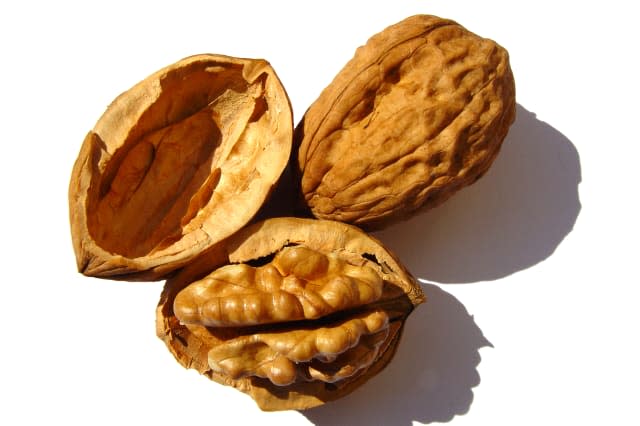Ten best foods to eat if you have arthritis

While there is no one food that can cure arthritis, studies show that eating certain foods can help to fight inflammation of the joints and ease the symptoms associated with the disease. Here are 10 of the best foods to eat if you have arthritis...
See also: How diet affects arthritis
See also: Arthritis - should you treat the pain with heat or cold?
1. Fatty Fish
Oily fish such as salmon, mackerel and sardines are high in omega-3 fatty acids, which are known to have a powerful anti-inflammatory effect. Researchers asked a group of people with rheumatoid arthritis to eat either fatty fish, lean fish or lean meat four times each week. After eight weeks, the group which ate the fatty fish had less inflammation.
Other studies have found that taking omega-3 fatty acid supplements lessens the intensity of joint pain and morning stiffness, while also reducing the need to take pain relief in those with rheumatoid arthritis.
Arthritis Research UK advises consuming oily fish at least twice a week. Sardines are a good option as they contain calcium (and vitamin D which helps the body absorb calcium), which can help lower your risk of developing osteoporosis – which those with rheumatoid arthritis are more likely to suffer from.
If you choose to take a fish-based supplement, experts recommend taking pure fish oil rather than fish liver oil. If you don't like fish, you can benefit from omega-3 polyunsaturated fatty acids by eating free range eggs and adding flaxseed or rapeseed oil to your food.
2. Garlic
Garlic and other allium vegetables, such as onions, leeks and chives, have been shown to have an anti-inflammatory effect. Eating them regularly may help prevent and even slow the progression of osteoarthritis, according to researchers from King's College London and the University of East Anglia.
Allium vegetables contain a compound that blocks the enzymes that eat away at the cartilage, protecting joints from damage. If you don't like the taste of garlic, try taking an odourless garlic supplement.
Garlic isn't just good for arthritis. Studies show that it may strengthen the immune system, as well as having cancer-fighting properties and lowering the risk of heart disease and dementia.
3. Ginger
Eating ginger may help lessen pain in people with osteoarthritis of the knee, according to a study carried out 2001. After six weeks, 63% of the 261 patients who took ginger extract reported less knee pain.
Ginger and its components are thought to block the production of substances that promote inflammation in the body. Eating ginger – either fresh, dried, or in powder form, may reduce inflammation and lessen the symptoms of arthritis.
4. Broccoli
Broccoli is one of the best vegetables you can eat if you suffer from arthritis. The vegetable contains sulforaphane, which blocks enzymes that cause joint damage associated with osteoarthritis.
Sulforaphane is so effective in the treatment of osteoarthritis that scientists at pharmaceutical company Evgen Pharma have created a drug (Sulforadex) based on the compound.
One study which analysed the diets of 1,005 women found that eating cruciferous vegetables, such as broccoli, was associated with lower levels of inflammatory markers. Broccoli is also a good source of vitamin K, which may help to slow the progression of osteoarthritis, according to a separate study from Boston University School of Medicine.
5. Turmeric
Turmeric - a spice widely used in Indian cooking - contains a compound called curcumin, which has been shown to ease the pain of knee osteoarthritis and regulate the body's immune response, reducing the inflammation associated with rheumatoid arthritis.
6. Walnuts
Walnuts are packed with omega-3 fatty acids, which help reduce the inflammation associated with joint disease. An analysis of 13 studies found that eating walnuts was linked to reduced markers of inflammation. Research has shown that people with arthritis who ate walnuts experienced lower levels of pain and were able to reduce their use of arthritis medications.
7. Berries
Berries are bursting with antioxidants, vitamins and minerals, and are also rich in quercetin, which has been found to block some of the inflammatory processes associated with arthritis in some studies.
In another study, women who ate at least two servings of strawberries per week were 14% less likely to have an elevated level of inflammatory markers in the blood.
Eating an antioxidant-rich diet helps reduce the inflammation associated with rheumatoid arthritis and other inflammatory types of the condition. In addition, antioxidants are known to support the immune system, which may be suppressed in those taking anti-inflammatory medication.
To get your antioxidants, eat a variety of colourful fruits and vegetables - particularly dark-coloured fruit, such as black grapes, blueberries, blackcurrants and prunes.
8. Spinach
Spinach is packed with the antioxidant kaempferol, which is known to decrease the effects of the inflammatory agents associated with rheumatoid arthritis. One study found that kaempferol reduced inflammation and prevented the progression in those with arthritis, leading to researchers to conclude that kaempferol may be therapeutic agent for the treatment of the disease.
9. Extra-virgin olive oil
Extra-virgin olive oil contains a natural phenolic compound called oleocanthal, which prevents the production of pro-inflammatory COX-1 and COX-2 enzymes. This reduces inflammation and eases the pain of rheumatoid arthritis, much in the same way that ibuprofen works.
Opt for extra-virgin olive oil from Tuscany as these are said to have the highest oleocanthal levels. One study analysed the diets of 333 people with and without rheumatoid arthritis, and found that olive oil consumption was associated with a lower risk of the disease.
10. Tart cherry juice
Tart cherry juice contains a potent mix of nutrients, and may help reduce the symptoms of arthritis. In one study, researchers gave a group of participants either two 8-ounce (237-ml) bottles of tart cherry juice or a placebo every day for six weeks. Those who drank tart cherry juice experienced significantly decreased symptoms of osteoarthritis and reduced inflammation.



